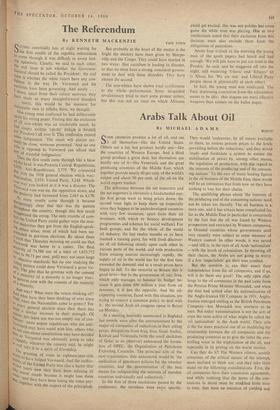The Referendum
By KENNETH MACKENZIE
CAPE TOWN
SirriNG convivially late at night waiting for 1.3 the first results of the republic referendum to come through it was difficult to avoid feel- ing optimistic. Clearly, we said to each other, the real issue is not whether the Governor- General should be called the President: the real issue is whether the white voters have any con- fidence in the way Dr. Verwoerd and his racialists have been governing. And surely . . . I mean, apart from their colour neurosis, they have made so many straightforward blunders • • surely, this would be the moment for reasonable men to rebuke them, we thought. Ne young man confessed he had deliberately Spoilt his voting paper. Feeling that the exclusion haall non-whites was an intolerable insult, he simply written '1./.1URIJ' (which is Swahili for `Ereedom') all over it. This confession caused 8°Ille indignation. 'The result will almost cer- tainly be close: someone protested. 'And no one sort is Opposed to Verwoerd can afford that of wasteful indignation.' hen the first result came through like a blow clan9 the head. It was Pretoria Central. Republicans, :,.8; Anti-Republicans, 2,779. We compared Nationalists, with the 1958 general election which was: Nationalists, 5,933; United Party, 3,248. Which- e•\,‘, er Way you looked at it it was a disaster. The therwoerd vote was up, the opposition down, and c majority had increased from 2,685 to 4,179. As more results came through it became tharniPeningly clear that this was the pattern e:cnithout the country, though this first result f' rt taerated the swing. The only crumbs of corn- s° gg he United Party could gather were them as- ve majorities they got from the English-speak- i„ urban areas, most of which had been un- o?n,tested in previous elections. By about three vc'oek that Thursday morning we could see that _crwoerd was home in a canter. The final 'naiorit , Y of 74,580 out of a total of 1,633,772 b,,'es (a 90.73 per cent. poll) may not seem large :dbfective standards, but no one studying the to ling Pattern could deny Verwoerd a great vic- ofrY' Te gibe th at he govers wit te cnsen a mihnoority of a minority n is noh lonhgero true:t e f governs now with the consent of the majority a minority. AnA,,nd Why? What were the voters thinking of? 194u° . what have they been thinking of ever since . when the Nationalists came to power? For beeevery general election since then there has co„n a similar increase in their strength. Of fid"rse, this latest test was not simply one of con- vervvnce some ardent republicans who are anti- ..ocrd may have voted with him, others who th:ot care about constitutions may have decided a 1 as Verwoerd was obviously going to take siepublic whatever the country said, he might ell take it in a spirit of friendship.
teateams granting of votes to eighteen-year-olds ms to have helped Verwoerd. And.the ineffec- tweivrY of the United Party was also a faCtor (for take c Years now they have been refusing to vote`_ moral stands because it might lose them way' and they have been losing the votes any- together with the respect of the principled). But probably at the heart of the matter is the fright the electors have been given by Sharpe- ville and the Congo. They could have reacted in two ways: that racialism is leading to disaster, or that we must have a strong, consistent govern- ment to deal with these disorders. They have chosen the second.
The non-whites have shown total indiflerence to the whole performance. Some misguided revolutionary tried to start some protest strikes, but this was not an issue on which Africans could get excited; this was not politics but some game the white man was playing. One or two intellectuals noted that their exclusion from this decision must also exclude them from the obligations of patriotism.
About four o'clock in the morning the young' man of the spoilt papers had heard and had enough. 'We will just have to put our trust in the Pondos,' he said, and he staggered off into the night, still muttering 'Uhuru' and 'Sibanye' (it is Xhosa for 'We are one' and Liberal Party people shout it platonically at each other).
In fact, the young man was vindicated. The final, depressing conclusion from the referendum seems to be this: that slogans are more effective weapons than crosses on the ballot paper.






































 Previous page
Previous page